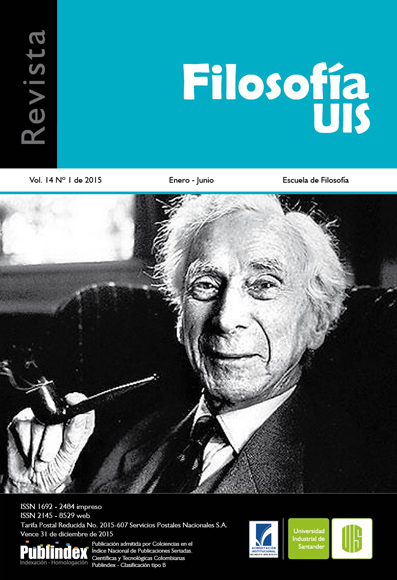Mass culture and affirmative culture within the conflict between individuals and society. An aproximation from the sociocritical theory
Published 2015-06-05
Keywords
- society,
- individual,
- mass culture,
- conflict
How to Cite
Copyright (c) 2015 Harold Valencia López, Luis A. Zuñiga Herazo

This work is licensed under a Creative Commons Attribution 4.0 International License.
Abstract
The main goal of this paper is to examine how the study of mass culture made by the Frankfurt School can analyze the conflict between individual and society, from a different perspective to that one studied by the tradition of modern philosophy, especially, from that called social contract theories. To achieve this objective we will, first, discuss the reformulation that Herbert Marcuse does about the conflict between individual and society, in the conflict culture theory of Freud; then, we will study how mass culture seems to overcome the conflict, when it, apparently has achieved a harmony between the individual and society. Our hypothesis is that Marcuse, ultimately, prefers to focus more on the conflict between individual and society than on its apparent solution. This is because, for him, the existence of the conflict maintains, at least, the conscious of the excision, a condition for the preservation of critical thinking in the society.
Downloads
References
- Adorno, T. (1969). “La industria cultural”. La Industria Cultural. Buenos Aires: Galerna.
- Adorno, T. (1972). Filosofía y superstición. Madrid: Taurus.
- Blesa, P. (2006). “Medios de comunicación y democracia: ¿El poder de los medios o los medios al poder?” Revista Sphera Pùblica. Número 6. pp. 87-106.
- Entel, A. (2001). Acerca de la felicidad: Un análisis de tres escritos de Herbert Marcuse. Buenos Aires: Prometeo.
- Freud, S. (1997). “Los dos principios del acaecer psíquico”. Obras completas. Buenos Aires: Biblioteca Nueva.
- Hobbes, T. (1999). El Leviatán. Madrid: Alianza.
- Horkheimer, M. y Adorno, T. (1969a). Dialéctica del iluminismo. Buenos Aires: Sur.
- Horkheimer, M. y Adorno, T. (1969b). La sociedad: Lecciones de sociología. Buenos Aires: Proteo.
- Guerra, F. (1992). Modernidad e independencias. Ensayos sobre las revoluciones hispánicas. Madrid: Mapfre.
- Jay, M. (1974). La Imaginación dialéctica. Una historia de la escuela de Frankfurt. Madrid: Taurus.
- Kant, E. (1986). “Respuesta a la pregunta ¿Qué es la ilustración?” Revista Argumentos. Número 16. pp. 45-76.
- Locke, J. (2006). Segundo tratado sobre el gobierno civil. Madrid: Tecnos.
- Marcuse, H. (1967). “Acerca del carácter afirmativo de la cultura”. Cultura y sociedad. Buenos Aires: Sur.
- Marcuse, H. (1974). “El envejecimiento del psicoanálisis”. Sexualidad y represión. Buenos Aires: Escuela Talcahuano.
- Marcuse, H. (1979). La agresividad en la sociedad industrial avanzada. Madrid: Alianza.
- Marcuse, H. (1995). El hombre unidimensional. Barcelona: Planeta-Agostini.
- Marcurse, H. (2003). Eros y civilización. Barcelona: Ariel.
- Martin Barbero, J. (1998). De los medios a las mediaciones. Bogotá: Convenio Andrés Bello.
- Marx, K. (2008). La ideología alemana. Valencia: Universitat Valencia.
- Muñoz, B. (2000). Adorno Theodor: Teoría crítica y cultura de masas. Madrid: Fundamentos.
- Ortega y Gasset, J. (1970). La Rebelión de las Masas. Madrid: Espasa Calpe.
- Rousseau, J. J. (1998). El origen de las desigualdades entre los hombres. México. Fondo de Cultura Económica.
